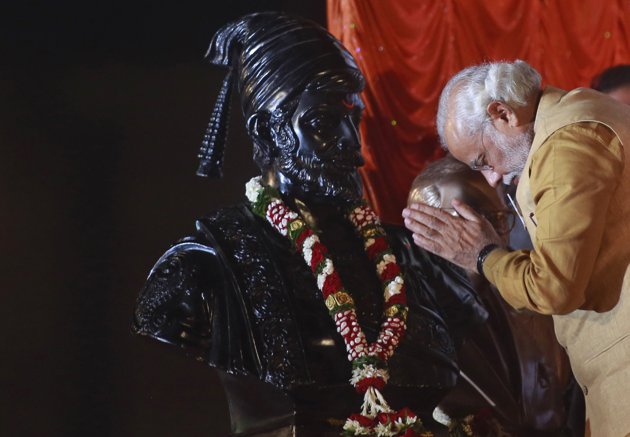 Religion has had a complicated history in Indian politics and remains at the centre of how we see ourselves as Indians.
Religion has had a complicated history in Indian politics and remains at the centre of how we see ourselves as Indians.
All press releases from the Gujarat government’s information department on the email invariably have a profile picture of Swami Vivekananda, the visionary leader whom Prime Minister designate Narendra Modi eulogises and vouches for.
Modi has always tried to reach out to the youth, who have come to become his veritable constituency, through the ideology of Vivekananda.
He launched the December 2012 Assembly poll campaign in Gujarat in September, with a month- long Vivekananda Yuva Vikas Yatra, coinciding with the leader’s historic speech in Chicago 150 years ago. His yatra snaked through all the 182 assembly constituencies in the state.
This was followed up by the January 2014 celebrations of Vivekananda’s 150th birth anniversary. The celebrations highlighted the leader’s ideologies and the government claimed to be implementing initiatives based on them.
Narendra Modi has made no bones about his dedication to Swami Vivekananda. His website profusely quotes from the spiritual leader and buttresses his “India First” slogan. It cites Vivekananda: “Don’t look back. Move forward with infinite enthusiasm, infinite daring and infinite patience. Then alone can great deeds be accomplished.”
The site, www.narendramodi.in, says India First is all about “collective efforts and inclusive growth”. It conveys the impression that Modi implements what Swami Vivekananda stood for.
Syama Prasad Mookerjee
During the poll campaign in Varanasi, the people saw the photographs of Narendra Modi being dwarfed or replaced in the party offices by those of Syama Prasad Mookerjee and Atal Bihari Vajpayee.
In his address at Madhopur, Punjab last year, Modi had blamed India’s first Prime Minister Jawaharlal Nehru for the death of Mookerjee. “Syama Prasad died for the country, nobody recognised his sacrifice. People were not told the truth about his death. It was Nehru who did not pay heed to the letter of Mookerjee’s mother,” Modi had told a rally.
The Jan Sangh founder was born in a Bengali Hindu family on July 6, 1901. Mookerjee began his political career in 1929 when he entered the Bengali Legislative Council as a Congress candidate representing the University of Calcutta. He, however, resigned the next year when the Congress decided to boycott the legislatures.
Initially a strong opponent of the Partition, Mookerjee later disfavoured Hindus living under a government controlled by the Muslim League after the 1946- 47 communal riots. He is revered by the members and supporters of the RSS and the VHP.
Deendayal Upadhyaya
Bhul Gaya Rang, Bhul Gai Chakri, Teen Cheej Yad Rahi, Noon, Tel, Lakri.
(I forgot all colours, all enjoyments. And could remember only three things—salt, oil and firewood.) Ideally, these lines should have been written by a Marxist poet. But it was actually penned by someone who was an arch critic of the Leftism— Deendayal Upadhyaya, who was also not a supporter of capitalism. He believed in the foundation of a government in India which was evolved out of its traditional values.
Narendra Modi, the BJP’s PM designate, has announced that his government will celebrate the centenary birth anniversary of the Rightist leader in 2015. But few people know that there is a connection between Modi’s interest in eastern UP and the wish of Upadhyaya to politically transform the region. Barely 100 km away from Varanasi is Jaunpur ( earlier Kerakat) from where Upadhyaya had contested Lok Sabha by- election in 1963 as a Bharatiya Jan Sangh candidate.
Although he lost, he propounded the philosophy of integral humanism, a synthesis of the material and the spiritual; the individual and the universal, which ultimately became the guiding force of the RSS and the BJP. He is still so relevant for the BJP leaders that their speeches are incomplete without a mention of him.
Upadhyaya had launched Organiser a weekly newspaper in 1955, which eventually became the mouthpiece of the RSS.
Chhatrapati Shivaji
One of the inspirations to PM designate Narendra Modi is 17th century founder of Maratha empire, Chhatrapati Shivaji.
Shivaji’s relations with the Gujarati trading community in Surat is a bit controversial as certain historians claim that he and his men had looted Surat.
In fact, Modi had come in defence of Shivaji, saying it would be improper to say that Shivaji looted Surat.
“It would be an insult to Chhatrapati Shivaji to claim he looted Surat. He did not loot the city, but only the treasure of Aurangazeb,” Modi said at an event organised at the Maharashtra’s Raigad fort in January 2014. Modi heaped praise on Shivaji for his inclusive rule and unity of all the communities under his rule. “Shivaji Maharaj integrated people. He took everyone along and worked towards the goal,” Modi said in his Raigad speech. He also commended him for his contribution towards good governance and human management.
It is evident that Modi adopted one of the Shivaji’s strategies during the election campaign. Shivaji’s adversaries went on back foot when he killed Afzal Khan, trusted and able general of Adil Shah II of Bijapur. As Shivaji had gone for the biggest adversary in terms of position and fame, Modi, too, targeted Sonia and Rahul Gandhi throughout his campaign and ignored the other leaders who tried in vain to bait him. The Congress too went on a back foot when its high command was targeted by Modi.





